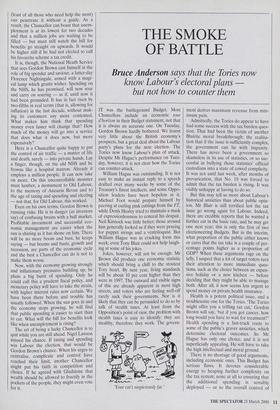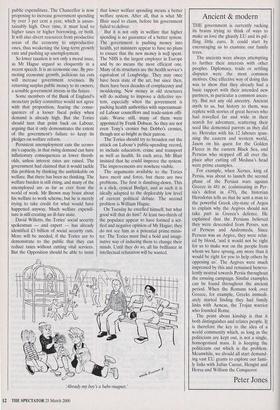THE SMOKE OF BATTLE
Bruce Anderson says that the Tories now
know Labour's electoral plans — but not how to counter them
IT was the battleground Budget. Most Chancellors include an economic tour d'horizon in their Budget statement, not that it is always an accurate one. On Tuesday, Gordon Brown hardly bothered. We learnt very little about the British economy's prospects, but a great deal about the Labour party's plans for the next election. The Tories now know Labour's plan of attack. Despite Mr Hague's performance on Tues- day, however, it is not clear how the Tories can counter-attack.
William Hague was outstanding. It is not easy to make an instant reply to a speech drafted over many weeks by some of the Treasury's finest intellects, and some Oppo- sition leaders have been hopeless at it. Michael Foot would prepare himself by peering at curling pink cuttings from the FT, while Denis Healey tried to maintain a mask of expressionlessness to conceal his despair. Neil Kinnock was little better; those around him generally looked as if they were praying for puppet strings and a ventriloquist. But William Hague was in cracking form this week; even Tony Blair could not help laugh- ing at some of his jokes.
Jokes, however, will not be enough. Mr Brown did produce one economic statistic which should bring a chill to the stoutest Tory heart. By next year, living standards will be about 10 per cent higher than they were in 1997. The outward and visible signs of this are already apparent in most high streets, and voters who are feeling well-off rarely sack their governments. Nor is it likely that they can be persuaded to do so by talk of stealth taxes. At least from the Opposition's point of view, the problem with stealth taxes is easy to identify: they are stealthy, therefore they work. The govern- 'Your cat's suspiciously fat.' ment derives maximum revenue from min- imum pain.
Admittedly, the Tories do appear to have had some success with the tax burden ques- tion. That had been the victim of another Blairite moral breakthrough: the realisa- tion that if the issue is sufficiently complex, the government can lie with impunity. There has never been a government so shameless in its use of statistics, or so suc- cessful in bullying those statistics' official custodians into a state of cowed complicity. It was not until last week, after months of prevarication, that No. 10 was forced to admit that the tax burden is rising. It was visibly unhappy at having to do so.
But this may tell us more about Labour's historical anxieties than about public opin- ion. Mr Blair is still terrified lest the tax issue go wrong again for Labour. Indeed, there are credible reports that he wanted a further cut in the basic rate, and he may get one next year; this is only the first of two electioneering Budgets. But in the interim, what proportion of the public either knows or cares that the tax take is a couple of per- centage points higher as a proportion of GDP? When these arguments rage on the telly, I suspect that a lot of target voters turn their attention to more immediate ques- tions, such as the choice between an expen- sive holiday or a new kitchen — before deciding that they might be able to manage both. After all, it now seems less urgent to spend money on private health insurance.
Health is a potent political issue, and a troublesome one for the Tories. 'The Tories might offer you a trifling tax cut,' Gordon Brown will say, tut if you got cancer, how long would you have to wait for treatment?' Health spending is a fast-track route to some of the public's graver anxieties, which determine electoral outcomes. So Mr Hague has only one choice, and it is not superficially appealing. He will have to take the high intellectual and moral ground.
There is no shortage of good arguments, including economic ones. This Budget has serious flaws. It devotes considerable energy to heaping further complexity on the tax system; none at all to ensuring that the additional spending is sensibly deployed — or to the overall control of public expenditure. The Chancellor is now proposing to increase government spending by over 3 per cent a year, which is unsus- tainably high. Over time, it must lead to higher taxes or higher borrowing, or both. It will also divert resources from productive areas of the economy to unproductive ones, thus weakening the long-term growth rate and pushing up unemployment.
So lower taxation is not only a moral issue, as Mr Hague argued so eloquently in a recent speech. It is an economic one. By pro- moting economic growth, judicious tax cuts will increase government revenues. By returning surplus public money to its owners, a sensible government invests in the future.
Some members of the Bank of England's monetary policy committee would not agree with that proposition, fearing the conse- quences of a looser fiscal policy when demand is already high. But the Tories should turn that point back on Labour, arguing that it only demonstrates the extent of the government's failure to keep its pledges on welfare reform.
Persistent unemployment cuts the econo- my's capacity, in that rising demand can have inflationary consequences at lower thresh- olds, unless interest rates are raised. The government had claimed that it would tackle this problem by thinking the unthinkable on welfare. But there has been no thinking. The welfare burden is still rising, and many of the unemployed are as far as ever from the world of work. Mr Brown may boast about his welfare to work scheme, but he is merely trying to take credit for what would have happened anyway. Much welfare expendi- ture is still creating an ill-fare state.
David Willetts, the Tories' social security spokesman — and expert — has already identified £3 billion of social security cuts. More will be needed, if the Tories are to demonstrate to the public that they can reduce taxes without cutting vital services. But the Opposition should be able to insist that lower welfare spending means a better welfare system. After all, that is what Mr Blair used to claim, before his government failed to deliver.
But it is not only in welfare that higher spending is no guarantee of a better system. The government is pushing money into health, yet ministers appear to have no plans to ensure that the new money is well spent. The NHS is the largest employer in Europe and by no means the most efficient one. Many of its structures are the health service's equivalent of Longbridge. They may once have been state of the art, but since then, there have been decades of complacency and mouldering. New money in old structures will do nothing to improve a defective sys- tem, especially when the government is packing health authorities with superannuat- ed Labour councillors and trade-union offi- cials. Worse still, many of them were appointed by Frank Dobson. So they are not even Tony's cronies but Dobbo's cronies, though not so bright as their patron.
The Tories should try to broaden out the attack on Labour's public-spending record, to include education, crime and transport as well as health. In each area, Mr Blair insisted that he could improve the system. The improvements are nowhere visible.
The arguments available to the Tories have merit and force, but there are two problems. The first is dumbing-down. This is a slick, cynical Budget, and as such it is ideally adapted to the deplorably low level of current political debate. The second problem is William Hague.
On Tuesday he excelled himself, but what good will that do him? At least two-thirds of the populace appear to have formed a set- tled and negative opinion of Mr Hague; they do not see him as a potential prime minis- ter. The Tories must find a bold and imagi- native way of inducing them to change their minds. Until they do so, all his brilliance in intellectual refutation will be wasted.
'Already my boy's a babe-magnet.'



































































 Previous page
Previous page